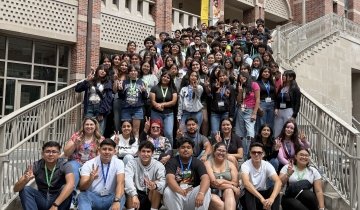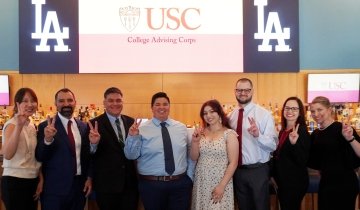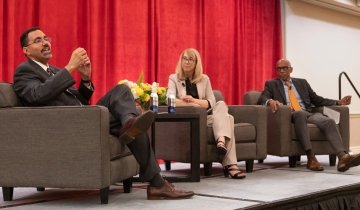"Racism is America's longest-standing social problem. Racial inequities remain pervasive in workplace settings and the larger society,” says Shaun Harper, executive director of the USC Race and Equity Center. “At the same time, our educational institutions teach students far too little, sometimes nothing at all, about diversity, equity and inclusion (DEI).”
Students in many fields are graduating without the skills needed to effectively address issues of race and implicit bias in their workplaces. “A lot of the work that we do at the Center is remediation,” says Harper. “We work with professionals to teach them the things they never learned in their educational training.”
The Center’s mission is to illuminate, dismantle and disrupt racism in all its forms and is “unapologetically race-forward,” according to Harper. It provides dynamic research, professional learning and organizational improvement for educational institutions, government agencies, nonprofit organizations and a multitude of industries in the U.S. and abroad. Participants in its evidence-based educational programs become leaders in the quest for racial equity and informed advocates for all those experiencing marginalization.
One of the nation’s foremost DEI experts, Harper is University Professor and Provost Professor of Education and Business at the USC Rossier School of Education and the USC Marshall School of Business. He founded the Center for the Study of Race and Equity in Education at the University of Pennsylvania in 2011. When he joined USC in 2017, the Center relocated to become the USC Race and Equity Center.
“We come to the table, not simply to highlight the pervasiveness of injustice and inequity,” Harper says of the Center’s goals, “but to share tools, solutions and learning opportunities—to teach leaders, workers and everyday Americans how to effectively combat inequities and injustices.”
“Diverse companies are more productive. When you don’t treat your employees fairly, you have high turnover. It becomes difficult to recruit, hire and train talented people. But when organizations like Nike lead the way, it’s saying this is not theoretical. This is attainable.” —Brandi Junious, Director of Corporate Partnerships, USC Race and Equity Center
Rigorous interdisciplinary research is key to the Center’s evidence-based methods. At USC, more than 100 faculty members collaborate on research with Center experts and contribute to the development of useful tools such as the annual National Assessment of Collegiate Campus Climates. The Black Students 50-State Report Card grades public colleges and universities on racial equity indicators, and a recent report offers professional sports teams and leagues resources for advancing racial justice.
Since its inception, the Center has worked with more than 700 partners and clients, with projects ranging from strategic advice for academic and business leaders to multi-session corporate and campus-wide training series. Courses are led by an interdisciplinary cadre of more than 60 distinguished scholars and DEI experts.
At USC, the Center provides no-cost, multiyear professional DEI learning experiences to administration, staff and faculty. These live virtual sessions can accommodate up to 10,000 employees.
“Most of our work at the Center is focused on educators, administrators and leaders, and equipping them with the skills that are needed to better teach and lead,” says Harper, who also holds the Clifford and Betty Allen Chair in Urban Leadership at USC Rossier. “We educate them about isms and phobias: sexism, racism, homophobia, transphobia, ageism and more. But more importantly, we’re teaching them how to disrupt and dismantle those isms and phobias in the workplace.”
DEI training programs like the Center’s Racial Equity Leadership Academies educate professionals to develop cultures of inclusion within their own organizations. Equity-focused curricula help them learn to talk about race and racism, increase their understanding of DEI practices and develop strategies to implement positive change in their organizations.
Learning opportunities are customized to fit the specific needs of businesses and institutions. “We can be working with a company as big as Nike on a Monday,” says Harper, “then addressing two dozen teachers in an individual middle school on Tuesday, and working with a group of STEM department chairs on Wednesday.”
K-12 Racial Equity Academies
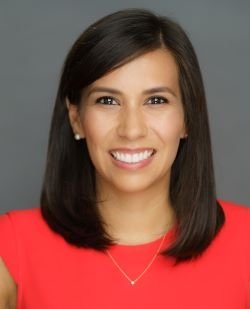
We’re responsible for educating all of our students, especially students of color who experience dire racial inequities and who have been historically marginalized in schools,” says Erica Silva EdD ’19, associate director for the Center’s K–12 Professional Learning Programs. “At this time, when the national conversation around equity is so polarized, the Center plays a role in dismantling racism in schools.”
In 2021, 15% of students in America’s public schools identified as Black and 27.5% as Latino/Hispanic. Partnering with schools throughout California and across the country, the Center’s K–12 Racial Equity Academies offer principals, counselors, superintendents, faculty and staff the tools they need to serve their diverse student bodies.
Latino and African American students comprise 82% of the Los Angeles Unified School District’s population. In 2020, Harper partnered with LAUSD to create a Racial Equity Leadership Academy for principals and administrators in the nation’s second-largest school district. The Center’s chief academic officer, USC Rossier Professor of Clinical Education John Pascarella, designed and facilitated the ongoing project in coordination with the district’s Darnise Williams EdD ’09. Participants completing the program received an executive leadership certificate from USC Rossier.
In 2021, Pascarella hired Silva to co-design and co-lead workshops for Year 2 of the LAUSD academy. “We ask leaders, ‘What does it mean to be equity-minded when you’re seeking to retain teachers of color, when you’re analyzing and assessing your curriculum or evaluating your school library?’ We work to build racial literacy within schools and districts and provide actionable tools and strategies for our participants to advance racial equity within their organizations,” Silva says.
“A lot of the work that we do with leaders is remediation. We are teaching leaders and faculty things that they never learned in their educational or professional trainings.” —Shaun Harper, Founder and Executive Director, USC Race and Equity Center
The academy offered a DEI learning series to 124 principals and administrators in LAUSD. “By approaching their work with a race-conscious lens, leaders were able to go back to their school communities and have productive discussions about race and racism with school staff,” notes Silva, who joined USC Rossier as the associate director for K–12 professional programs in 2021 and, later, as an adjunct professor in the Master of Arts in Teaching Program.
Adalberto Vega, principal of John Liechty Middle School in the Pico-Union neighborhood of Los Angeles, says, “The academy allowed me to understand my own biases and gave me the confidence to lead Liechty stakeholders in brave conversations about race.”
As part of a schoolwide focus on racial equity, Vega addressed inequities faced by Black/African American students. He worked with school leaders to create the Black Students Matter Committee. To include it in schoolwide objectives, the principal embedded his racial equity project in Liechty’s annual School Plan for Student Achievement. As the initiative progressed, he collaborated with the Los Angeles Center for Love and Justice and LAUSD’s Local District Central to inaugurate anti-racist educational projects for students and parents.
In 2021, the Center launched a Racial Equity Academy for Inglewood Unified School District, to provide DEI training for 800 teachers, counselors and administrators in the Los Angeles County-based district.
The Center has worked with public and independent schools and districts across California and the nation and plans to expand its program to include more opportunities for teachers and school leaders to learn how to advance racial equity in their organizations.
STEM Racial Equity Leadership Academy
The Center’s Racial Equity Leadership Academies have helped administrators and faculty in a range of academic disciplines acquire much-needed skills in the practice of racial equity. The Racial Equity Leadership Academy for STEM Leaders is targeted to rectify inequities in college-level science, technology, engineering and math departments.
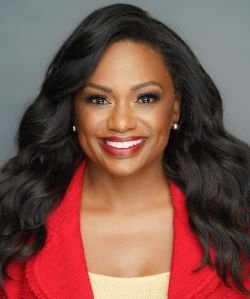
“Discussions that involve race are often treated as off-limits in engineering and computer science classrooms and departments,” says USC Rossier Research Professor Brandi P. Jones, a national thought leader in DEI for STEM disciplines. “No clear or uniform structure exists to prepare faculty for discussions on race and racism, particularly in highly technical disciplines.”
The lack of recognition for racial inequities in STEM departments has serious consequences for higher education, the workforce and the national economy. Offering context to one of his presentations to the academy, Harper cited the notable graduation gap between Black, Indigenous, Latinx, Pacific Islander and multiracial students who choose STEM majors and those who ultimately attain degrees in
their chosen fields.
Offering a solution, the Center launched its first Racial Equity Leadership Academy for STEM Leaders in 2021. The nine-month program for 250 STEM department chairs from across the nation was funded by the Alfred P. Sloan Foundation. Once a month, these academic leaders met for live virtual learning sessions. For many, this was the first time they had seriously addressed issues of race and racism
within their disciplines.
Harper, Jones and Kendrick Davis comprise the creative team for the STEM academy. As project leader, Davis, who is an associate professor at USC Rossier and the Center’s chief research officer, facilitated the STEM academy’s monthly sessions. Presentations addressed contemporary DEI dilemmas and racial problems in classrooms and labs. Participants learned to identify systemic inequities embedded in curricula and to address discriminatory policies and practices. They collaborated on discipline-specific equity action plans with colleagues in their respective fields.
Another important topic was how to engage in sensitive discussions. Jones, the Center’s chief operating officer and chief of staff, recently led a STEM academy session on productive departmental conversations about race and racism. She modeled exercises on a series of questions: “How do you talk about race in fields where we don’t generally talk about race? Who has the power and privilege to speak in a classroom? What are the questions that students of historically underrepresented backgrounds may have?” Jones’ questions lead participants to “discover ways to create practices, systems and structures in which everyone can thrive.”
Nike multiyear DEI learning partnership
“We’re talking about the biggest brand on the planet,” Harper says, discussing the Center’s dynamic multidimensional partnership with Nike. Launched in 2020, the partnership focuses on advancing DEI in every continent where the Nike, Converse and Jordan brands operate.
From the C-suite to the warehouse, the two-year program provides meaningful equity training to employees at all levels of the company. Learning experiences are tailored to the specific needs of senior executives, headquarters staff, and manufacturing, retail and distribution workers. “As we engage the corporation’s 75,000 employees, we’re developing a scalable, replicable approach to partnering with businesses of comparable magnitude,” notes Harper.
Since its inception, the Center has acquired vast experience helping corporations achieve their equity goals. In 2019, it partnered with USC Marshall to launch a professional DEI learning portfolio for businesses, firms, government agencies, cities and other organizations—providing its live virtual learning experiences to companies ranging from Citibank and T-Mobile to Wondery, PayScale and more.
The massive companywide endeavor with Nike began in 2019 with a DEI Leadership Acceleration Academy for nearly 400 Nike leaders from around the globe. Framed within the context of the Nike workplace, sessions addressed such issues as how to recognize and reduce implicit bias, best practices for partnering with employee networks, and strategies for disrupting homophobia and heterosexism. In 2022, the Center launched the Professional Learning Series, a course of live, online DEI learning sessions for thousands of Nike managers worldwide. Additionally, 60 digital shorts were produced on a range of DEI topics for all Nike employees worldwide.

Brandi Junious, the Center’s director of corporate partnerships, points to an important area of the corporation—the Nike United Networks. “At Nike, affinity groups represent Black and LGBTQIA+ employees, women and others,” she says. “We’re working with network leaders to help them with language, tools and activities they need to move the DEI project forward.”
The Center’s work with Nike and other businesses is grounded in their research on organizations of all sizes and contexts. “Data shows that diverse companies are more productive,” Junious says. “When you don’t treat your employees fairly, you have high turnover. It becomes difficult to recruit, hire and train talented people. But when organizations like Nike lead the way, it’s saying this is not theoretical. This is attainable.”
The future
Looking back over the Center’s achievements, there’s something Harper would like to change. “I’d like to get ahead of the process before people enter leadership positions,” he says. “That’s an important role for higher education. We ought to better prepare students for citizenship work and for eventual leadership on DEI issues.”
In January 2022, Harper brought Christopher Emdin to the Center. Emdin is the Center’s inaugural director of youth engagement and community partnerships and a USC Rossier professor of education. “Chris will create new programs designed specifically for young people,” says Harper.
Among the Center’s ongoing projects, a national commission on historically Black colleges and universities and racial equity launched in January. Also, a two-year initiative that began in November focuses on improving academic success among male students of color in community colleges across the country.
“We don’t have a ‘just add water’ approach at the Center,” Harper notes. “Because, honestly, that’s not what equity is. Equality is giving everybody the exact same thing in equal shares, in equal amounts. Equity is giving people what they need and customizing it to meet their needs. It’s understanding the unique context of everyone we work with."




